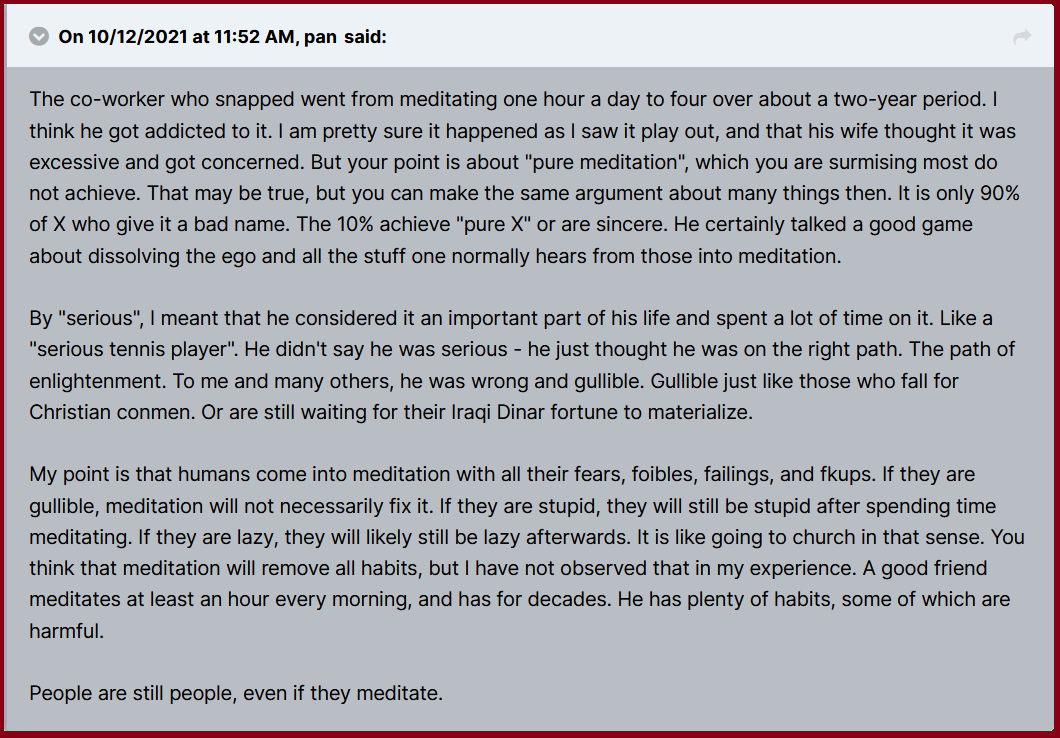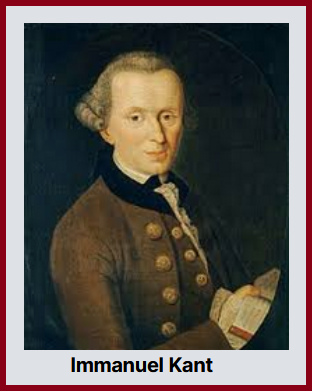No need to become obsessive...


In India we have a word, yogabhrasta: one who has fallen from yoga. This word is very, very strange. It appreciates and condemns together. When we say somebody is a yogi, it is a great appreciation. When we say somebody is yogabhrasta, it is also a condemnation: fallen from the yoga. This man had attained up to meditation somewhere in his past life and then fell down. From meditation the possibility of going back to the world is still there -- because of asmita, because of amness. The seed is still alive. It can sprout any moment; so the journey is not over.
When asmita also disappears, when you no longer know that you are -- of course, you are but there is no reflection upon it, that "I am," or even amness -- then happens samadhi, trance, ecstasy. Samadhi is going beyond; then one never comes back. Samadhi is a point of no return. From there nobody falls. A man in samadhi is a god: we call Buddha a god, Mahavir a god. A man in samadhi is no longer of this world. He may be in this world, but he is no longer of this world.
He doesn't belong to it. He is an outsider. He may be here, but his home is somewhere else. He may walk on this earth, but he no longer walks on the earth. It is said about the man of samadhi he lives in the world but the world does not live in him.
Niyam and asan, regularity and posture: they are for the body. A controlled body is a beautiful phenomenon -- a controlled energy, glowing, and always more than is needed, and always alive, and never dull and dead. Then the body also becomes intelligent, body also becomes wise, body glows with a new awareness.
Then, pranayam is a bridge: deep breathing is the bridge from mind to body. You can change the body through breathing; you can change the mind through breathing. Pratyahar and dharana, returning home and concentration, belong to the transformation of the mind. Then dhyan is again a bridge from mind to the self, or to the no-self -- whatsoever you choose to call it , it is both. Dhyan is the bridge to samadhi.
The society is there; from the society to you there is a bridge: yam. The body is there; for the body: regularity and posture. Again there is a bridge, because of the different dimension of mind from the body: pranayam. Then, the training of the mind: pratyahar and dharana, returning back home and concentration. Then again a bridge, this is the last bridge -- dhyan. And then you reach the goal,
samadhi.
Samadhi is a beautiful word. It means now everything is solved. It means samadhan - everything is achieved. Now there is no desire; nothing is left to achieve. There is no beyond; you have come home.

There are many stories about Immanuel Kant. He became obsessive about regularity; it became a madness. He had a fixed routine, so fixed, second to second, that if somebody, a guest has come, he will look at the clock and he will not even say anything to the guest, because that saying will take time -- he will jump into the bed, cover himself with the blanket, and he has gone to sleep and the guest is sitting there. The servant will come and say, "Now you go, because that was his time." The servant became so atuned to Kant that there was no need to say, "Your food is ready," and no need to say. "Now you go to sleep." Only the time had to be said. The servant will come in the room and say, "lt is eleven o'clock, sir." So he will follow immediately because there was no need to say anything. He was so regular that the servant became the dictator -- because he will always threaten him, "I will leave. Raise my pay." immediately, the pay has to be raised because another servant, a new man, will disturb the whole thing.
Once they tried also: a new man came, but it was not possible, because Kant was living second to second. He would go to the university; he was a great teacher and a great philosopher. One day the road was muddy and it was raining, and one of his shoes got stuck in the mud -- so he left it there. Otherwise he will be late. So he went with one shoe on. It was said in th e university area of Konigsberg that people looking at him would fix their watches, because everything was absolutely clock wise.
A new neighbor purchased the house adjacent to Kant's house and he started planting new trees. Every day at exactly five o'clock in the evening, Kant used to come to that side of the house and sit near the window and look at the sky. Now the trees covered the window and he could not look at the sky. He fell sick. He fell so sick... and the doctors could not find anything wrong with him, because he was such a regular man. He was really tremendously healthy. They could not find anything; they couldn't diagnose. Then the servant said, "You don't bother. I know the reason. Those trees are intruding on his regularity. Now he cannot go to the window and sit there and look at the sky. Looking at the sky is no longer possible." The neighbour had to be persuaded. The trees were cut, and he was okay; the illness disappeared.
But this is obsession. No need to become obsessive.
Everything has to be done with understanding.
The Alpha & The Omega: The Yoga Sutras of Patanjali, Vol 5, Chaper 5
 turiya
3 y
470
turiya
3 y
470
 turiya
3 y
786
turiya
3 y
786
 turiya
2 y
404
turiya
2 y
404
 turiya
2 y
387
turiya
2 y
387
 turiya
2 y
403
turiya
2 y
403
 turiya
2 y
488
turiya
2 y
488
 turiya
2 y
358
turiya
2 y
358
 turiya
2 y
436
turiya
2 y
436
 turiya
2 y
442
turiya
2 y
442




